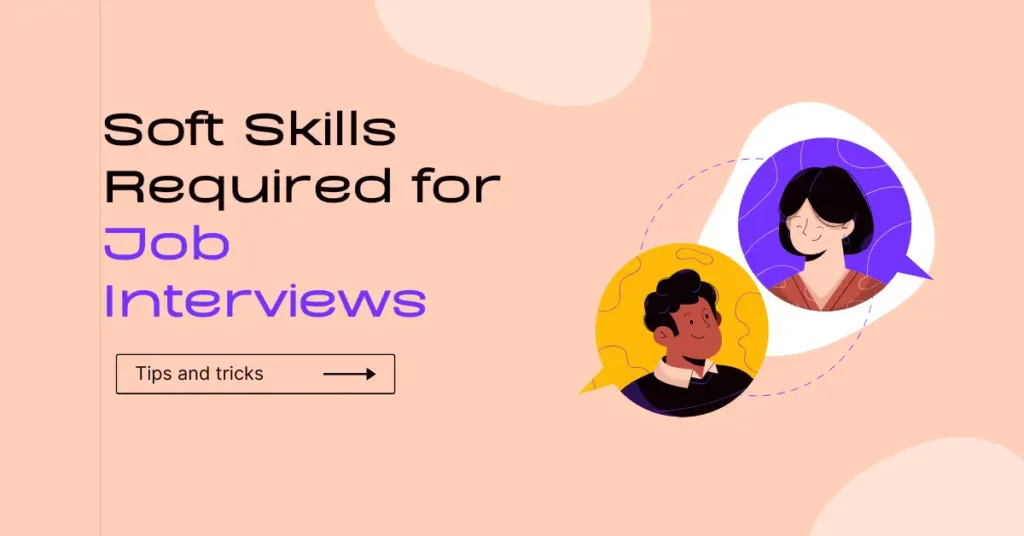In today’s competitive job market, technical qualifications alone aren’t enough to land your dream role. Employers are increasingly looking for candidates who possess the right soft skills—those intangible qualities that define how you work, communicate, and collaborate with others.
Whether you’re a fresh graduate, an experienced professional, or switching careers, understanding the soft skills required for job interviews can give you the edge over equally qualified applicants.
What Are Soft Skills?
Soft skills refer to a combination of interpersonal, communication, and behavioral traits that influence how a person interacts with others and approaches their work. Unlike hard skills (like coding or data analysis), soft skills are harder to quantify but are essential for workplace success.
These skills often determine:
- How well you fit into a team
- Your ability to resolve conflicts
- How you handle stress and deadlines
- Your adaptability to new challenges
Why Soft Skills Matter in Job Interviews
Job interviews aren’t just about what you know—they’re about how you present yourself. Recruiters assess your:
- Communication abilities
- Team collaboration potential
- Emotional intelligence
- Problem-solving mindset
Even for technical roles, hiring managers often use interviews to evaluate how a candidate might respond to challenges, fit into company culture, or grow into leadership positions.

Top 10 Soft Skills Required for Job Interviews
1. Communication Skills
Clear, confident communication is critical in every role.
In the interview:
- Speak clearly and concisely
- Avoid jargon unless asked
- Listen actively and respond thoughtfully
Tip: Practice mock interviews to improve verbal fluency and eye contact.
2. Confidence
Confidence conveys that you believe in your abilities and are ready for the role.
In the interview:
- Maintain good posture and eye contact
- Use a calm and steady tone
- Don’t be afraid to pause before answering
Tip: Prepare a few success stories that demonstrate your achievements.
3. Emotional Intelligence (EQ)
EQ is the ability to understand and manage your emotions, and those of others.
In the interview:
- Stay calm under pressure
- Show empathy when discussing teamwork
- Demonstrate self-awareness in discussing failures
Tip: Reflect on how you handle stress and relationships at work.
4. Adaptability and Flexibility
Today’s workplaces change fast. Employers want people who can pivot and thrive in uncertainty.
In the interview:
- Mention how you handled unexpected changes in past jobs
- Emphasize your openness to learning new tools or processes
Tip: Use STAR format (Situation, Task, Action, Result) to explain examples.
5. Problem-Solving Skills
Being a good problem-solver shows initiative and critical thinking.
In the interview:
- Share a time you solved a complex issue
- Walk the interviewer through your thinking process
- Emphasize collaboration if applicable
Tip: Choose real problems with measurable outcomes.
6. Time Management
Good time management shows you’re organized, reliable, and self-disciplined.
In the interview:
- Talk about how you prioritize tasks
- Share how you meet deadlines or manage multiple responsibilities
Tip: Use productivity tools or scheduling methods as proof of your process.
7. Teamwork and Collaboration
Most roles require working with others effectively.
In the interview:
- Share stories where you worked in a team
- Describe how you handled disagreements
- Emphasize listening and contributing equally
Tip: Highlight outcomes that benefited the team, not just yourself.
8. Leadership Potential
Even in junior roles, leadership is valued. It means taking ownership and inspiring others.
In the interview:
- Talk about moments you took initiative
- Share any experience mentoring, managing, or guiding peers
Tip: Leadership is about influence, not titles. Think broadly.
9. Work Ethic and Integrity
Employers want dependable, honest employees who take responsibility seriously.
In the interview:
- Share examples where you went above and beyond
- Mention feedback or recognition you’ve received for dedication
Tip: Avoid blaming others when discussing failures—show accountability.
10. Curiosity and Willingness to Learn
A curious mind is a growing mind. Companies value those who keep learning.
In the interview:
- Mention online courses, certifications, or self-study
- Talk about how you improved a weakness
Tip: Be specific—name the platforms or mentors that helped you learn.
How to Showcase Soft Skills in an Interview
🟢 Use the STAR Method
Structure your answers using:
- Situation: Describe the context
- Task: What was the objective?
- Action: What did you do?
- Result: What was the outcome?
Example: “In my last internship (Situation), I was responsible for improving onboarding documents (Task). I conducted interviews with new hires and rewrote the guides (Action), reducing onboarding time by 30% (Result).”
🟢 Ask Thoughtful Questions
Asking good questions at the end of the interview shows:
- Communication
- Curiosity
- Cultural awareness
Examples: - “What qualities do successful team members usually have here?”
- “How do team members give and receive feedback?”
🟢 Match Your Soft Skills to the Job Description
If the job ad mentions teamwork, flexibility, or problem-solving, use those exact words and back them up with examples.
How to Develop Soft Skills Before an Interview
✅ Join Workshops or Courses
- Public speaking (Toastmasters, Coursera)
- Emotional intelligence training
- Conflict resolution or communication classes
✅ Volunteer or Intern
Real-world experience builds teamwork, responsibility, and leadership.
✅ Practice With Friends or Mentors
Mock interviews help with confidence, articulation, and handling pressure.
Conclusion: Soft Skills Are the Secret Weapon in Job Interviews
While your qualifications and technical skills may get your resume noticed, it’s your soft skills that make you stand out in the interview. Demonstrating strong communication, adaptability, emotional intelligence, and problem-solving abilities can often be the deciding factor between you and another equally qualified candidate.
Take time to develop and practice these soft skills, and you’ll not only succeed in interviews—but thrive in the workplace.
